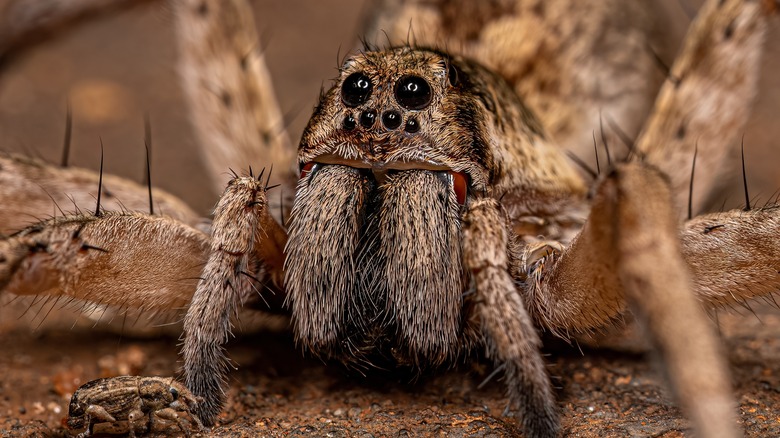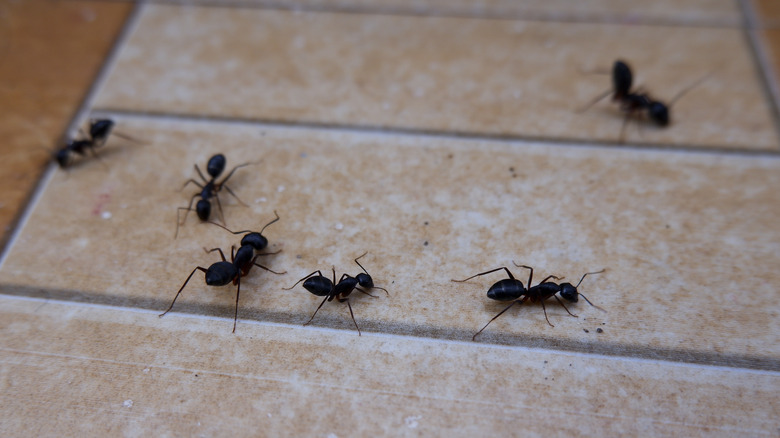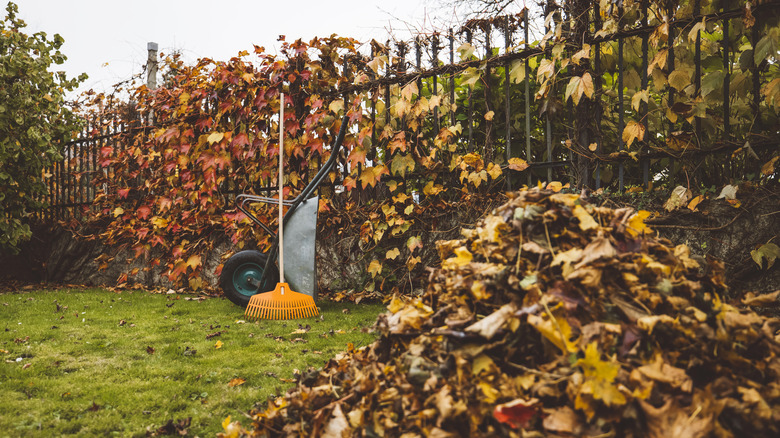Hacks That Will Eliminate Wolf Spiders From Your Home For Good
We may receive a commission on purchases made from links.
It's never pleasant to encounter a wolf spider in your home, and these alarming-looking arachnids are both common and widespread. There are about 240 species of wolf spiders in North America alone, according to Britannica. While wolf spiders prefer the cover of stone, leaf, or log piles, they also sometimes make their way into homes. One of the fundamental ways you can discourage them is by regularly checking any areas around your home that wolf spiders like to hide in, as well as conducting regular cleaning and decluttering to prevent both them and their prey from sneaking inside and taking up residence. You may even be able to use certain natural deterrents to make your home less inviting, and fixing any issues with your walls or foundation can also help to keep wolf spiders out.
If you're on a mission to figure out how to get rid of spiders in your home and prevent them from coming back, you might be considering fumigation. While it can be tempting to enlist professional help for a wolf spider (those furry bodies are enough to make even the most spider-tolerant take fright), pest control is only necessary in extreme cases. Wolf spiders in themselves are not dangerous — they can bite when they are threatened, but they are not venomous. Before you consider chemical pest control, know that this is usually a last resort and is not recommended for an occasional wolf spider. The following steps are the place to start if you're looking to evict a few of these eight-legged "guests".
Ensure there are no other pests drawing wolf spiders to your home
Once one pest enters your home, predators are likely to follow. This principle very much applies to wolf spiders. In fact, one of the most common reasons why wolf spiders enter homes is that they've found reliable sources of food. Among these include flies, ants, and roaches. If you see multiple wolf spiders in your house, chances are you might have an underlying pest problem you need to address.
A lone wolf spider isn't a huge concern, and you'll probably be able to tackle the situation by implementing pest control on your own. To start, keep your house clean with regular vacuuming and mopping sessions and ensure that spilled food isn't attracting insects into your home. If you're dealing with a bigger pest issue along with numerous spiders though, it may be time to call a professional pest control service. They can also help determine whether your walls are full of unwanted pests, including rats, termites, and spiders. Keep in mind that, due to their size, wolf spiders are more likely to hang out on the ground and catch prey that tries to fly or scurry by.
Seal any cracks or other openings in your home
While general pest prevention can help discourage wolf spiders from wanting to use your home as a reliable place to get their meals, this doesn't address the problem of using your abode as a shelter. Unlike other types of spiders that create visible webs, wolf spiders tend to hide out of sight. Dark basements, garages, and sheds are among some of their favorite spots, especially when it's cold outdoors. And, if they can easily slip through a crack or hole close to any of these areas, this makes things even more convenient.
To prevent wolf spiders from using your home as a place of shelter, it's important to regularly inspect the building for signs of openings and cracks. If you do find any small open spaces that could easily be used as entry points into your home by a wolf spider (or any other pest), seal these up right away. Be sure to fill in any gaps that may develop around doors or windows which could be accessed by a wolf spider. Even if you can't see any cracks, water leaking into your basement can be one of the signs there's a problem with your home's foundation. Moisture issues can also create an ideal environment for wolf spiders. If crawl spaces and wall cavities are part of the problem, consider filling these hard-to-reach areas with spray foam insulation, such as the Gorilla Foam Seal which you can get for around $10 per can on Amazon.
Get rid of common hiding spots for wolf spiders
After crawling in through cracks, gaps, and holes around your home, the common household spots wolf spiders like to hide usually consist of places which are dark and where they can hunt undisturbed. If you have old boxes or piles of clutter in your home, such spots could become safe havens for wolf spiders looking for cover or perhaps a place to feast on prey. Hiding spots aren't exclusive to inside your home, though. Certain spaces outside of your house can also become places of shelter for these spiders, which can subsequently increase the likelihood that they may eventually try to access the inside of your home at some point. Examples include piles of old leaves and logs in your yard, as well as neglected children's toys, gardening tools, or planters. Aside from taking shelter in hiding spots, female wolf spiders may also use these spaces to deposit their egg sacks.
To get rid of hiding spots for wolf spiders, you may need to think like one. Take a hard look around the inside and outside of your home for areas that might attract them, and promptly get rid of the clutter. Also, you might want to reconsider using cardboard boxes for anything other than moving. Instead, store your items in airtight plastic containers so wolf spiders won't be able to access them.
Consider essential oils or fragrant plants
Providing you aren't dealing with a serious infestation, you may be able to get rid of spiders by using common household staples such as cinnamon sticks or essential oils. But take note, this isn't a proven method, as there appears to be more anecdotal than scientific evidence to support the use of essential oils as spider deterrents. While some blogs claim that spiders have an aversion to tea tree, citrus, peppermint, and cedar oils due to their strong scents, mint essential oil is the only one that appears to have any scientific merit at this stage. A 2018 study published in the Journal of Economic Entomology, found that peppermint oil was effective in deterring brown widow and cupboard spiders, but the study did not extend to wolf spiders. A 2022 study, published in the same journal, reported possible deterrent effects associated with ginger and clove essential oils. Again, wolf spiders were not a target of this study.
That said, using essential oils can be a wonderfully non-toxic way to help repel critters, and even though there isn't a ton of evidence supporting deterrence of wolf spiders just yet — it can't hurt to try. To use essential oils as a natural spider repellent, fill a spray bottle with water and add several drops of the desired oil. Spray around areas that wolf spiders might be tempted to crawl and hide in. While perhaps not as potent, you may also consider plants instead of essential oils. Scientific evidence is lacking, but there are some anecdotal reports that suggest mint, eucalyptus, lavender, and marigold plants may help deter spiders.
Trap them in a plastic cup and release them outside
If you want to live in peace with wolf spiders and aren't at a point where you need professional pest control, you can consider employing a catch-and-release method for the occasional spider you come across. This hack is one of the best ways to get rid of a wolf spider from your home because it's effective while safe for both you and the spider. For this method, you'll need a sturdy piece of paper or a thin sheet of cardboard, along with a large plastic cup. A clear cup is even better, as this can help you determine whether you've actually caught the spider without having to look and accidentally let it loose again. To complete the catch-and-release tactic, slide the paper or cardboard underneath the wolf spider and then place the plastic cup on top of it. Hold the cup against the paper as you take both items outdoors. Lift the cup and watch the spider roam free, or you can let them leave at their own pace and retrieve the cup at a later time.
There are two scenarios in which you should not try this hack. First, if you're not very comfortable around spiders, chances are you may not be steady enough to trap a wolf spider in a cup. Also, you should never try to trap a potentially venomous or unknown species.





